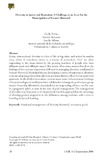| dc.description.abstract | Today, ethnocultural diversity is a fact of life in big cities, and indeed in smaller ones, where it sometimes serves as a means of promotion. How are cities responding to the issues raised by the growing numbers of people who have different needs and different tastes? This article offers some answers based on the findings of two surveys of practices followed in managing diversity, conducted in Greater Montréal. Municipalities are developing a variety of responses to diversity: some are adopting policies that advocate accommodation, others favour a universal approach. In the field of recreation, various issues arise: infrastructures (redesign of recreational spaces) and interethnic cohabitation (changes in preferences, group issues). Generally, Montréal’s municipalities are responding ad hoc, case by case, in a pragmatic spirit, as seen in the case of pool management. The management of diversity may thus seem to be improvised, but this approach has the advantage of allowing gradual adaptation to the differences among residents, with a view to fostering reciprocal learning. | en_US |

